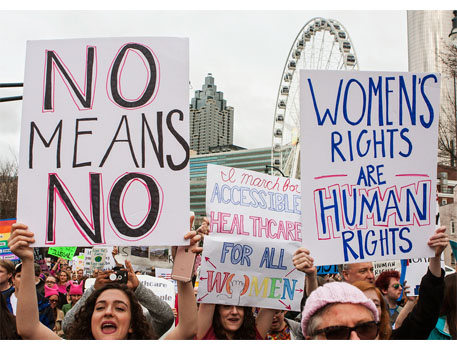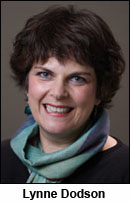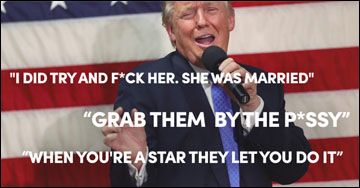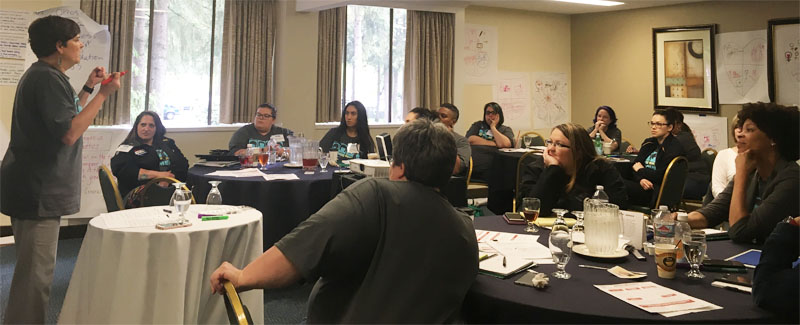OPINION
#MeToo power shift must be sustained by organized labor
Unions can lead the way on empowering women, ending sexual harassment
By LYNNE DODSON
(Nov. 13, 2017) — A change has come. It was a long time coming, but at last, there are consequences for those who sexually harass women. But why now? And how can we sustain lasting change?
 Sexual harassment isn’t new. It’s been a strategy to coerce women and demonstrate power for centuries, from the raping of women slaves, to the sexualization of children in beauty contests, to the everyday (sadly) workplace harassment we’re talking about today. We know what it is. Sexual harassment isn’t just an innocent blunder by a goofy dude raised in a culture where women are objectified, so hey, how was he to know the problem with the pat on the butt, the leering breast gaze, the hand on the thigh, the threat with rejection, the promise with submission?
Sexual harassment isn’t new. It’s been a strategy to coerce women and demonstrate power for centuries, from the raping of women slaves, to the sexualization of children in beauty contests, to the everyday (sadly) workplace harassment we’re talking about today. We know what it is. Sexual harassment isn’t just an innocent blunder by a goofy dude raised in a culture where women are objectified, so hey, how was he to know the problem with the pat on the butt, the leering breast gaze, the hand on the thigh, the threat with rejection, the promise with submission?
Sexual harassment isn’t just a pussy grab, it’s a power grab.
We all heard the Access Hollywood tape prior to the presidential election. Donald Trump wasn’t talking about the joy of sensuality, the thrill of seduction. He was talking about the joy of entitlement. He was talking about the thrill of demonstrating his positional power.
That’s how sexual harassment works. It’s about power. This isn’t news to those who have experienced it, or who have perpetrated it. Millions of people, mostly women, have endured sexual harassment. They’ve (we’ve) talked with other women, with spouses and friends, filed complaints, left jobs, and dealt with it quietly – afraid of the consequences, afraid of being sexualized by co-workers, afraid of being seen as a victim. Along with the fear was the courage to deal with it, in a myriad of ways, subtle revenge, silence, speaking up. They (we) accepted it as a fact of professional life.
 In 1991, Anita Hill, a young law school professor sat before a congressional panel of white men in televised hearings and told about the sexual harassment she suffered as a lawyer at the Equal Employment Opportunity Commission — of all places! — from her boss, Supreme Court nominee Clarence Thomas. I believed her. Every woman I talked with believed her. The Senate, 98% of whom were men, voted 52-48 to confirm Thomas anyway. Millions of people watched the proceedings.
In 1991, Anita Hill, a young law school professor sat before a congressional panel of white men in televised hearings and told about the sexual harassment she suffered as a lawyer at the Equal Employment Opportunity Commission — of all places! — from her boss, Supreme Court nominee Clarence Thomas. I believed her. Every woman I talked with believed her. The Senate, 98% of whom were men, voted 52-48 to confirm Thomas anyway. Millions of people watched the proceedings.
That year, 11 women ran for U.S. Senate, five of them won. Twenty-four women won House seats. Patty Murray, Diane Feinstein, Barbara Boxer and Carol Moseley Braun were among those moved to run. Within the next few years, more women were elected to the Legislature in Washington than in any other state – to our high of 41%. In 2016 and 2017 – again more women were elected to office than since 1992. We’ve seen women entering the ranks of labor leaders and CEO’s, though it doesn’t take a statistician to see that we are nowhere near half, even though women make up nearly half of the workforce.
The change didn’t start with Anita Hill. But the hearings where she sat, resolute, and told the truth, resonated with millions of people. The injustice of the questions the committee asked her, the confirmation of Clarence Thomas – this changed us and made it easier for us to speak truth to power as well.
But as the decades passed, sexual harassment policies were implemented, and still, still, powerful men faced no consequences.
When Donald Trump was elected to the presidency after his Access Hollywood tape was released (among his other racist and xenophobic comments) something broke – our complacency, our silence, our acceptance of the status quo. We could feel change in the air when millions of women around the world wore pussy hats and marched together in protest. Millions of women, and the men who love them, said, “No.” Millions of people said, “there will be consequences for the abuse of power.”
 We’ve seen the resistance in a lot of ways – from lawsuits challenging his Muslim ban, to increased activism for Black Lives Matter, to the candidacies for public office of more people of color, more women of color, than we’ve seen in decades.
We’ve seen the resistance in a lot of ways – from lawsuits challenging his Muslim ban, to increased activism for Black Lives Matter, to the candidacies for public office of more people of color, more women of color, than we’ve seen in decades.
With the rise of the #MeToo, I’m reminded of the words of Sojourner Truth: “If the first woman God ever made was strong enough to turn the world upside down all alone, these women together ought to be able to turn it back, and get it right side up again! And now they is asking to do it, the men better let them.”
Right now, there is a power shift. Men in positions of power, in publishing, Hollywood, radio and TV, in the military, in politics, are being held to account for their behavior. Decent men are questioning their own behavior, abusers are denying or hiding. Women and men who’ve been subjected to sexual harassment are talking. People who thought they were immune because of their power are losing their jobs. We are finally seeing consequences for serial harassers who thought they were immune to the consequences.
But my husband reminded me of the anti-apartheid movement. Miriam Makeba famously remembered all of her friends proudly bragging about the anti-apartheid fight in South Africa in 1962: “We will be Free in ’63!” Seeing powerful men face the consequences of their actions is gratifying, but lasting change requires more of us.
In the labor movement, we are part of the change. It’s past time for those of us in the labor movement to be crystal clear that we won’t build worker power by abusing our own power. Now more than ever, labor needs creativity and activist energy from all of our members. But if half of them are silenced, stressed out, abused, humiliated, afraid to talk or stand up strong because of sexual harassment or sexism, our whole movement suffers. Men who care about labor and believe in solidarity, need to recognize how their behavior, or unwillingness to call out the behavior of other men, damages the movement and those ideas we believe in. Women in the labor movement are adding their voices to #MeToo – and those of us in labor are uniquely positioned to do something about it.
One way is to recognize that sexual harassment is a function of inequities in power and wealth. When we work to close the gender pay gap (it’s already reduced for unionized workplaces), and to set a clear path to leadership for women, we are mitigating the power imbalance and helping make the current change more permanent. Another way we can fight back is through our contract language and policies. Clear language on what sexual harassment is, what to do when it happens, and a process for redress have to be written into our contracts, our own procedures, and the laws and policies we champion.
We need not only to implement policies around sexual harassment, we need to follow them. Solidarity means standing with those who are harassed, believing them, and being the change we want to see. The AFL-CIO recently developed clear and strong guidelines around harassment and racist speech. President Richard Trumka read the statement at the opening of the 2017 AFL-CIO Convention, and appointed people who will hear and act on instances of harassment. The WSLC will be doing the same. There’s no place for this in our labor movement.
We know, in the labor movement, of the power in numbers, the power in uniting to speak the truth. We’re mad as hell and we’re not going to take it anymore.
It’s going to take more than a #MeToo to change things for real. It’s going to take more women speaking up. It’s going to take men, not only taking a thoughtful look at their own behavior, but calling out other men – letting them know that sexual harassment is intolerable under any circumstances. It can’t be okay for “boys to be boys” by demeaning and diminishing others. Not in state legislatures, not in our union halls, not anywhere.
There is a power shift. Powerful men are being taken down because of their actions. There is no excuse, there is no way to justify sexual harassment, not even when the president is the harasser in chief. Times have changed, and to sustain the change, we have to do what we do in the labor movement – believe her, stand in solidarity, speak truth to power, act on our “no tolerance” policies, listen, and change. The respect we show to others is a measure of the respect we have for ourselves.
 Lynne Dodson is Secretary Treasurer of the Washington State Labor Council, AFL-CIO.
Lynne Dodson is Secretary Treasurer of the Washington State Labor Council, AFL-CIO.







